|
|
|
Sort Order |
|
|
|
Items / Page
|
|
|
|
|
|
|
| Srl | Item |
| 1 |
ID:
106563
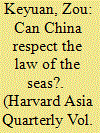

|
|
|
| 2 |
ID:
123051
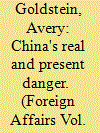

|
|
|
|
|
| Publication |
2013.
|
| Summary/Abstract |
Much of the debate about China's rise in recent years has focused on the potential dangers China could pose as an eventual peer competitor to the United States bent on challenging the existing international order. But another issue is far more pressing. For at least the next decade, while China remains relatively weak compared to the United States, there is a real danger that Beijing and Washington will find themselves in a crisis that could quickly escalate to military conflict. Unlike a long-term great-power strategic rivalry that might or might not develop down the road, the danger of a crisis involving the two nuclear-armed countries is a tangible, near-term concern -- and the events of the past few years suggest the risk might be increasing.
|
|
|
|
|
|
|
|
|
|
|
|
|
|
|
|
| 3 |
ID:
146500
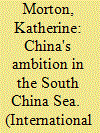

|
|
|
|
|
| Contents |
China's expanding presence in the South China Sea is now a major source of escalating tensions leading to a spiral of confrontation with the United States and the littoral states of east Asia. Under these conditions, conventional analysis suggests that serious conflict is almost inevitable. This article provides an alternative perspective by situating China's growing ambition within the broader transformation of maritime order in the contemporary era. On the basis of a new interpretation of maritime order, the study provides a deeper examination of China's motivations in relation to the maritime disputes, US–China strategic competition, and Xi Jinping's new strategy to achieve the great rejuvenation of the Chinese nation. The analysis of the legal, strategic and political dimensions of China's positioning in the South China Sea suggests that maritime nationalism rather than the quest for maritime hegemony is a central motivation driving Chinese actions. A second important insight is that the current approach is strengthening China's control, but undermining its legitimacy in the eyes of other major powers and stakeholders. By focusing on legitimacy as an organizing principle in maritime affairs, it becomes clear that the Chinese leadership stands to gain from integrating its ambition more fully into the evolving maritime order.
|
|
|
|
|
|
|
|
|
|
|
|
|
|
|
|
| 4 |
ID:
133093
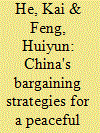

|
|
|
|
|
| Publication |
2014.
|
| Summary/Abstract |
Applying bargaining theory of international conflicts, we examine the successes and challenges of China's strategic choices in its ascent after the Cold War. We suggest that China needs to alleviate information and commitment problems in order to rise peacefully. Since 2008, China's "peaceful rise" strategy has faced serious challenges because of its "assertive turn" in diplomacy. We argue that China has not alleviated or settled these two problems successfully because of its ambiguous "core interest" diplomacy and undecided attitude regarding multilateral institutions in resolving the maritime disputes. China should engage in rule-based, institution building, such as a security community between China and ASEAN, to reinforce its peaceful rise commitments.
|
|
|
|
|
|
|
|
|
|
|
|
|
|
|
|
| 5 |
ID:
126387


|
|
|
| 6 |
ID:
126395
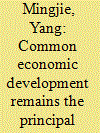

|
|
|
| 7 |
ID:
133609
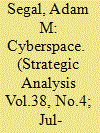

|
|
|
|
|
| Publication |
2014.
|
| Summary/Abstract |
In June 2013, President Obama met with President Xi Jinping at Sunnylands, California. The meeting was seen as a chance for the two leaders to get to know each other in a relatively informal setting so they could address the growing mistrust between their countries. While maritime disputes, trade tensions and differences over how to contain the North Korean and Iranian nuclear programmes were high on the agenda, cyber security-in particular Chinese cyber espionage-was the defining issue of this unusual summit. For the US, the meeting between the two presidents was the culmination of a long campaign to pressure Beijing to reduce the scope and scale of Chinese cyber attacks on the United States.
|
|
|
|
|
|
|
|
|
|
|
|
|
|
|
|
| 8 |
ID:
106724
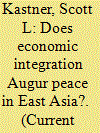

|
|
|
|
|
| Publication |
2011.
|
| Summary/Abstract |
At the end of the day, it is not clear that economic ties will act as a significant constraint on state behavior when high-stakes issues are on the table.
|
|
|
|
|
|
|
|
|
|
|
|
|
|
|
|
| 9 |
ID:
130599


|
|
|
|
|
| Publication |
2014.
|
| Summary/Abstract |
The centre of gravity of international relations is shifting to Asia Pacific. The Asian region has been characterized by intense cold war rivalries; numerous territorial and maritime disputes, undemocratic A and oppressive regimes. The United States has been involved as an 'anchor of security in the region. Asian countries have seen acute financial crisis in the past. Many countries have been victims of terrorism, insurgencies, militancy, and fundamentalism. Resource Iigompetition is intensifying. Proliferation of weapons of mass destruction (WMD), presents a threat to the region. The past has "also been tainted with massive violence and bloodshed. The Korean _?._are claimed two million lives and the Vietnam War took three million fives. Internal pogroms by Khmer rouge claimed two million lives. .me of these issues like the divided Korean peninsula and the cross- t tensions between China and Taiwan still persist. The region
[nines to face formidable security challenges.
|
|
|
|
|
|
|
|
|
|
|
|
|
|
|
|
| 10 |
ID:
178013
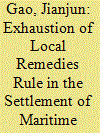

|
|
|
|
|
| Summary/Abstract |
The exhaustion of local remedies (“ELR”) rule is applicable in the settlement of maritime disputes, and it is not limited to the case of diplomatic protection. So far the manner in which the tribunals under the UN Convention on the Law of the Sea dealt with the ELR issue in the cases of the flag State’s protection has raised the concern that the rule may become a dead letter in practice. Although the cases involved the protection of natural and legal persons by States, the tribunals rejected the objections to the admissibility of claims raised by the respondents based on the ELR rule in all cases. However, the approaches in which the tribunals dealt with the ELR issue are questionable, and the practice of the International Tribunal for the Law of the Sea contains dual imbalances. In the case of a mixed claim, the preponderance test suggested by the International Law Commission should be employed to determine the nature of the plaintiff’s claim as a whole. The test was mentioned in several cases, but it was not used correctly.
|
|
|
|
|
|
|
|
|
|
|
|
|
|
|
|
| 11 |
ID:
140410
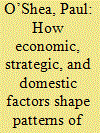

|
|
|
|
|
| Summary/Abstract |
Despite frequent talk of conflict and even war, economic and strategic factors suggest that the Sino–Japanese dispute over the East China Sea will not erupt into hot conflict, at least for the time being. However, for domestic reasons, overt cooperation remains a distant prospect.
|
|
|
|
|
|
|
|
|
|
|
|
|
|
|
|
| 12 |
ID:
120044
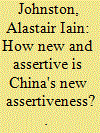

|
|
|
|
|
| Publication |
2013.
|
| Summary/Abstract |
There has been a rapidly spreading meme in U.S. pundit and academic circles since 2010 that describes China's recent diplomacy as "newly assertive." This "new assertiveness" meme suffers from two problems. First, it underestimates the complexity of key episodes in Chinese diplomacy in 2010 and overestimates the amount of change. Second, the explanations for the new assertiveness claim suffer from unclear causal mechanisms and lack comparative rigor that would better contextualize China's diplomacy in 2010. An examination of seven cases in Chinese diplomacy at the heart of the new assertiveness meme finds that, in some instances, China's policy has not changed; in others, it is actually more moderate; and in still others, it is a predictable reaction to changed external conditions. In only one case-maritime disputes-does one see more assertive Chinese rhetoric and behavior. The speed and extent with which the newly assertive meme has emerged point to an understudied issue in international relations-namely, the role that online media and the blogosphere play in the creation of conventional wisdoms that might, in turn, constrain policy debates. The assertive China discourse may be a harbinger of this effect as a Sino-U.S. security dilemma emerges.
|
|
|
|
|
|
|
|
|
|
|
|
|
|
|
|
| 13 |
ID:
151071


|
|
|
|
|
| Summary/Abstract |
Rising nationalism” has been a major meme in commentary on the development of China's material power since the early 1990s. Analysts often claim that rising nationalism, especially among China's youth, is an important force compelling the Chinese leadership to take a tougher stand on a range of foreign policy issues, particularly maritime disputes in East Asia. The rising nationalism meme is one element in the “newly assertive China” narrative that generalizes from China's coercive diplomacy in these disputes to claim that a dissatisfied China is challenging a U.S.-dominated liberal international order writ large. But is this meme accurate? Generally, research on Chinese nationalism has lacked a baseline against which to measure changing levels of nationalism across time. The data from the Beijing Area Study survey of Beijing residents from 1998 to 2015 suggest that the rising popular nationalism meme is empirically inaccurate. This finding implies that there are other factors that may be more important in explaining China's coercive diplomacy on maritime issues, such as elite opinion, the personal preferences of top leaders, security dilemma dynamics, organizational interests, or some combination thereof.
|
|
|
|
|
|
|
|
|
|
|
|
|
|
|
|
| 14 |
ID:
131260
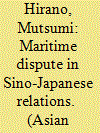

|
|
|
|
|
| Publication |
2014.
|
| Summary/Abstract |
My aim in this article is to shed light on some domestic dimensions of the maritime dispute between China and Japan in the East China Sea, in particular those of the Japanese side. The domestic dimensions are important because many actors are involved and the dispute is multidimensional. We may need to set longer time frames in order to find exit strategies and at least mitigate the influence of this seemingly intractable dispute. I suggest mid- to long-term alternative approaches to resolving it.
|
|
|
|
|
|
|
|
|
|
|
|
|
|
|
|
| 15 |
ID:
186101
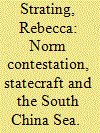

|
|
|
|
|
| Summary/Abstract |
Since 2009, the South China Sea disputes have taken on increasing global significance. Situated within a rapidly transforming political landscape, these sovereignty and maritime disputes are totemic of contests over the regional security order and the institutions, rules and laws that support it. The United States has explicitly called upon ‘like-minded’ allies and partners to defend the so-called ‘rules-based order’ against the revisionism of the rising People’s Republic of China, including in the maritime domain. In particular, the South China Sea has become a highly visible arena of ‘normative contestation’, one that raises questions about how norm-preservationist regional powers enact security practices to uphold their preferred vision of order. This study uses Australia as a regional power case study to assess the interests and approaches of a key US ally to normative contestation in the South China Sea. It addresses two questions: first, how does Australia perceive and articulate its interests in the South China Sea? Second, what security practices - diplomatic, legal and operational – can a regional power such as Australia bring to bear in its statecraft? It argues that as a regional power, Australia has adopted a normative approach to upholding maritime order. While Canberra has ratcheted up the rhetoric on the importance of maintaining the ‘rules-based order’ in response to China’s actions in the South China Sea, its security practices have retained a routine, ‘business-as-usual’ quality. This approach is designed to support maritime rules while avoiding economic retaliation from Beijing, reflecting broader strategic dilemmas as a middle-sized state wedged between two great powers. Unpacking the nuances of Australia’s South China Sea statecraft provides important insights for understanding for the preparedness and limitations of regional powers in defending their preferred conception of maritime order.
|
|
|
|
|
|
|
|
|
|
|
|
|
|
|
|
| 16 |
ID:
123573
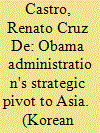

|
|
|
| 17 |
ID:
142818
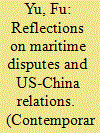

|
|
|
| 18 |
ID:
126452
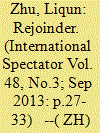

|
|
|
|
|
| Publication |
2013.
|
| Summary/Abstract |
This rejoinder to Daniel Twining's article in the last issue (48:2, June 2013) of The International Spectator argues that both China and the United States recognise how important their relationship is for the world and the Asia-Pacific in particular. But the risk of tension on the security front has increased recently due to the US' policy toward maritime disputes that has actually involved meddling between the parties involved, and its 'pivot' to Asia which targets China with more military engagement in the region. The China-US relationship has never been an easy one with the US certain of its primacy and China proud of its glorious past, which almost makes a conflictual power transition a self-fulfilling prophecy. Management of the relationship is the key for both countries to bring about more cooperation and to rein in competition. Co-evolution, a new type of relationship among major countries, is the only way out, in which the logic of interaction is 'live-and-let-live' rather than mors tua, vita mea.
|
|
|
|
|
|
|
|
|
|
|
|
|
|
|
|
| 19 |
ID:
126391
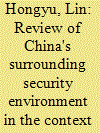

|
|
|
| 20 |
ID:
188208
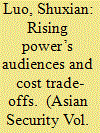

|
|
|
|
|
| Summary/Abstract |
Observers characterize China’s behavior in the South China Sea in the recent decade as a continuity of assertiveness, coercion, or delay. Yet, even within a pattern of continuity, China’s way of handling interstate crises arising from its maritime territorial claims has varied from case to case, vacillating between escalation that prioritizes “safeguarding sovereign rights” (weiquan) and deescalation that puts an emphasis on “maintaining stability” on its periphery (weiwen). How can we explain this variation? In this article, I develop a framework, the audience cost trade-off hypothesis, to explain when and why China is likely to escalate or deescalate in maritime disputes. I argue that when deciding whether to escalate, Chinese decision makers usually weigh and make a trade-off between their anticipated domestic political costs should they back down and their potential international costs should they take an escalatory stance. I illustrate the framework with a case study of two major interstate crises in the South China Sea: the 2012 China-Philippine standoff in the Scarborough Shoal and the 2014 Sino-Vietnamese clash over the deployment of the oil drilling platform HYSY-981.
|
|
|
|
|
|
|
|
|
|
|
|
|
|
|
|
|
|
|
|
|